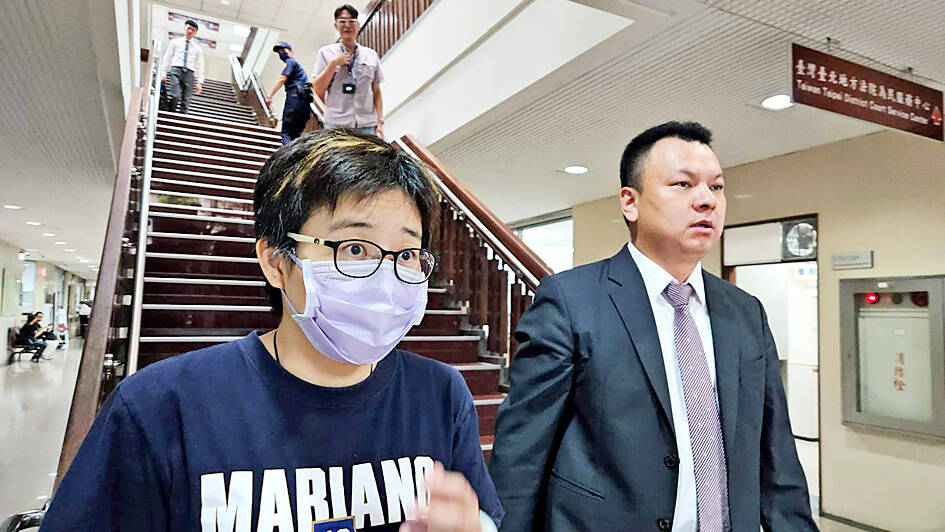The Constitutional Court yesterday ruled that insulting public officials is punishable under the Constitution, while defaming a public office is not.
The court sent a case about criticism of an official back to the Taiwan High Court for a retrial based on the interpretation.
The defendant, Yang Hui-ju (楊蕙如), in 2022 was found guilty of contravening Article 140 of the Criminal Code after Yang allegedly paid people to post criticism online of the Taiwan Economic and Cultural Office’s Osaka branch over its handling of evacuations of Taiwanese from Japan following a 2018 typhoon.

Photo: Wen Yu-te, Taipei Times
Su Chii-cherng (蘇啟誠), who was director-general of the office at the time, committed suicide in his residence shortly after the criticism began.
Article 140 stipulates a prison sentence of up to one year or a fine of up to NT$100,000 for “insult[ing] a public official during the discharge of his legal duties or publicly mak[ing] insults about his discharge of such legal duties.”
The office was accused by members of the public of failing to offer aid to Taiwanese when Kansai International Airport flooded when Typhoon Jebi hit Japan in 2018.
Yang sought a constitutional interpretation, saying that Article 140 contravenes constitutionally guaranteed free speech.
At a discussion at the Constitutional Court last year, a Ministry of Justice representative said that insulting public officials was not a crime unique to Taiwan and that those working on behalf of the country should be protected.
The Constitutional Court said that Article 140 has two parts, one referring to “slandering or defaming a public official” and one to “slandering or defaming a public office.”
Regarding the former part, if defamation is immediate and intended to obstruct an official, it should be punished, which would not contravene Article 11 of the Constitution, it said.
Article 11 says: “The people shall have freedom of speech, teaching, writing and publication.”
However, people are entitled to question, criticize or comment on the decisions of an office, as this is a part of democracy and civic oversight, it said.
Even if a member of the public were to simply curse the office or direct vulgar language at it as a means of venting their frustration, it would still be within their free-speech rights, it said.
It is difficult to imagine public defamation of an office having any immediate or noticeable effect on public officials carrying out their jobs, so criminalization under Article 140 would contravene the Constitution, it added.
Additional reporting by CNA

‘DENIAL DEFENSE’: The US would increase its military presence with uncrewed ships, and submarines, while boosting defense in the Indo-Pacific, a Pete Hegseth memo said The US is reorienting its military strategy to focus primarily on deterring a potential Chinese invasion of Taiwan, a memo signed by US Secretary of Defense Pete Hegseth showed. The memo also called on Taiwan to increase its defense spending. The document, known as the “Interim National Defense Strategic Guidance,” was distributed this month and detailed the national defense plans of US President Donald Trump’s administration, an article in the Washington Post said on Saturday. It outlines how the US can prepare for a potential war with China and defend itself from threats in the “near abroad,” including Greenland and the Panama

The High Prosecutors’ Office yesterday withdrew an appeal against the acquittal of a former bank manager 22 years after his death, marking Taiwan’s first instance of prosecutors rendering posthumous justice to a wrongfully convicted defendant. Chu Ching-en (諸慶恩) — formerly a manager at the Taipei branch of BNP Paribas — was in 1999 accused by Weng Mao-chung (翁茂鍾), then-president of Chia Her Industrial Co, of forging a request for a fixed deposit of US$10 million by I-Hwa Industrial Co, a subsidiary of Chia Her, which was used as collateral. Chu was ruled not guilty in the first trial, but was found guilty

A wild live dugong was found in Taiwan for the first time in 88 years, after it was accidentally caught by a fisher’s net on Tuesday in Yilan County’s Fenniaolin (粉鳥林). This is the first sighting of the species in Taiwan since 1937, having already been considered “extinct” in the country and considered as “vulnerable” by the International Union for Conservation of Nature. A fisher surnamed Chen (陳) went to Fenniaolin to collect the fish in his netting, but instead caught a 3m long, 500kg dugong. The fisher released the animal back into the wild, not realizing it was an endangered species at

DEADLOCK: As the commission is unable to forum a quorum to review license renewal applications, the channel operators are not at fault and can air past their license date The National Communications Commission (NCC) yesterday said that the Public Television Service (PTS) and 36 other television and radio broadcasters could continue airing, despite the commission’s inability to meet a quorum to review their license renewal applications. The licenses of PTS and the other channels are set to expire between this month and June. The National Communications Commission Organization Act (國家通訊傳播委員會組織法) stipulates that the commission must meet the mandated quorum of four to hold a valid meeting. The seven-member commission currently has only three commissioners. “We have informed the channel operators of the progress we have made in reviewing their license renewal applications, and